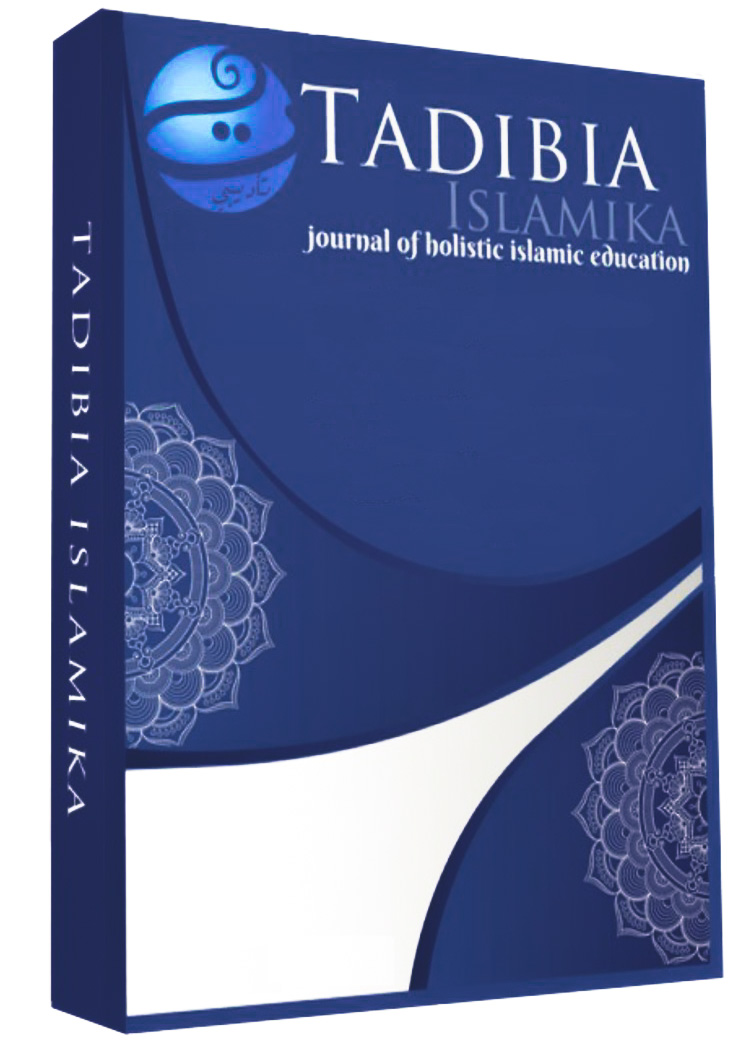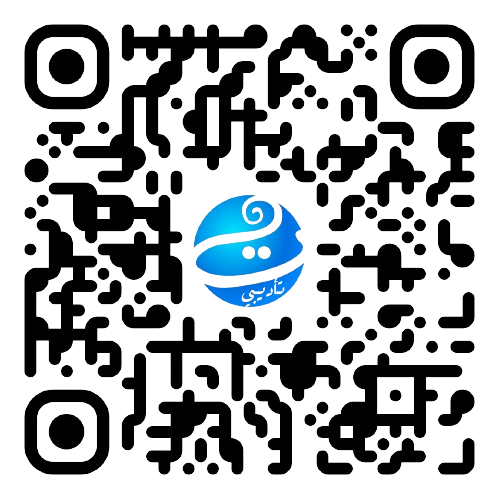Yā 'Ibādī method: Innovating Islamic education curriculum towards ma'rifatullāh (divine knowledge) in the digital age
DOI:
https://doi.org/10.28918/tadibia.v4i1.6920Keywords:
Digital era, ma'rifatullah, qur'anic education, spiritual growth, yā 'ibādī methodAbstract
In the digital era, effectiveness and flexibility are paramount. Digital technology offers convenience in all aspects of life, including the ease of both obedience and disobedience, depending on the user's personal abilities. This paper aims to explore, theorize, and demonstrate that the Yā 'Ibādī method—an innovative approach to ma'rifatullah (divine knowledge)—is practical, beneficial, and can serve as a foundational, applicative, preventive, curative, and constructive solution towards ma'rifatullāh in the digital age. Utilizing qualitative grounded theory research, this study finds that the Yā 'Ibādī method employs Qur'anic verses as its educational medium, emphasizing a spiritual journey towards ma'rifatullāh through understanding, tadabbur (contemplation), and the application of explicit and implicit themes in the Qur'an to navigate daily life's challenges. The Yā 'Ibādī method can be incorporated into the Islamic education curriculum as a pathway to ma'rifatullāh in the digital era. It provides ordinary believers with a means to experience 'seeing' and 'being seen' by Allah SWT through their hearts, anytime and anywhere. This spiritual practice is facilitated by Allah's guidance in fostering obedience, protecting from disobedience, and enabling believers to navigate the digital age with peace, joy, and security. By grounding its teachings in the Qur'an, the Yā 'Ibādī method offers a comprehensive framework for spiritual growth and resilience, ensuring that individuals can live faithfully and confidently amidst the complexities of modern life. This integration of traditional spiritual practices with contemporary digital conveniences highlights the method's adaptability and relevance, promoting a balanced and fulfilling approach to faith in the 21st-century.
References
Al-Kalabadzi, A. B. M. (1969). At-Ta’arruf li Madzhabi Ahl al-Tasawwuf. Maktabah al-Kulliyyāt al-Azhariyyah.
Al-Nablusi, M. R. (2016). Mengenal Allah: Rujukan Utama Makna Asmaul Husna dan Rahasia Penerapannya dalam Kehidupan [Knowing Allah: The Ultimate Reference to the Meaning of Asmaul Husna and the Secret of Its Application in Life]. Zaman.
Al-Qardhawi, Y. (1996). Niat dan Ikhlas [Intention and Sincerity]. Pustaka Al-Kautsar.
An-Naqsyabandani, S. D. A. al-K. (n.d.). Jami’ al-Ushūl fi al-Auliyā’. Al-Haramain.
An-Naisaburi, A. Q. A. al-Q. (n.d.). Ar-Risālah al-Qusyairiyyah. Dar al-Khair.
As-Sakandari, T. A. al-F. A. bin M. bin Abd al-K. ibn Athāillāh. (1971). Tartīb as-Sulūk. Dar al-Kutub al-‘Ilmiyyah.
As-Sakandari, T. A. al-F. A. bin M. bin Abd al-K. ibn Athāillāh. (n.d.). Syarh al-Hikam. Imaratullah.
As-Sakandari, T. A. al-F. A. bin M. bin Abd al-K. ibn Athāillāh. (2018). Mutu Manikam dari Kitab Al-Hikam [The Manikam Quality of the Book of Al-Hikam]. In S. M. I. Ibnu Ibad (Trans.) & D. A. Al-Buny (Ed.), Surabaya: Mutiara Ilmu.
As-Suhrawardi, S. S. (2006). Awārif al-Ma’ārif. Maktabah ats-Tsaqafah ad-Diniyyah.
Goddard, A. (2004). Budgetary practices and accountability habitus: A grounded theory. Accounting, Auditing & Accountability Journal, 17(4).
Hamzah, A. (2021). Metode penelitian Grounded Theory [Grounded Theory Research Methods]. Rajawali Press.
Hasbiyallah. (2019). Konsep pengenalan Allah (Ma’rifatullah) dan implikasinya terhadap pendidikan agama Islam [The Concept of God Recognition (Ma'rifatullah) and Its Implications for Islamic Religious Education]. Jurnal Perspektif, 3(1), May 2019.
Hudiyanti. (2022a). Buku Ya Ibadi Jilid 1: Rahmat dan Ampunan Allah [Ya Ibadi Book Volume 1: Allah's Mercy and Forgiveness]. ADT Sido Makmur.
Hudiyanti. (2022b). Buku Ya Ibadi Jilid 2: Introspeksi Diri [Ya Ibadi Book Volume 2: Self Introspection]. ADT Sido Makmur.
Hudiyanti. (2022c). Buku Ya Ibadi Jilid 3: Niat Ikhlas dalam Ibadah [Ya Ibadi Book Volume 3: Ikhlas Intention in Worship]. ADT Sido Makmur.
Hudiyanti. (2022d). Buku Ya Ibadi Jilid 4: Niat Ikhlas dalam Takdir Kehidupan [Ya Ibadi Book Volume 4: Ikhlas Intention in the Destiny of Life]. ADT Sido Makmur.
Hudiyanti. (2022e). Buku Ya Ibadi Jilid 5: Ketauhidan dan Ma’rifatullah [Ya Ibadi Book Volume 5: Belief in Allah and Ma'rifatullah]. ADT Sido Makmur.
Hudiyanti. (2022f). Implementasi niat ikhlas bagi orang tua dan penderita internet gaming addiction [Implementation of Ikhlas Intention for Parents and Patients with Internet Gaming Addiction] (Dissertation). UIN Walisongo Semarang.
Hudiyanti. (2023a). Kemerdekaan hakiki di era digitalisasi [True Freedom in the Age of Digitalization]. Buletin An-Nisa PC. FORDAF NU Kendal.
Hudiyanti. (2023b). Kurikulum Yā ‘Ibādī: Metode praktis perjalanan ruhani menuju ma’rifatullah [Yā 'Ibādī Curriculum: Practical Methods for the Ruhani Journey to Ma'rifatullah]. ADT Sido Makmur.
Hudiyanti. (2020). Tauhid aplikatif dasar: Implementasi niat ikhlas dalam aktivitas sehari-hari [Basic Applicative Tauhid: Implementation of Ikhlas Intention in Daily Activities]. ADT Sido Makmur.
Humam, A. (1990). Iqro’ Jilid 1-6 [Iqro' Volume 1-6]. Balai Litbang LPTQ Nasional Team Tadarus AMM Yogyakarta.
Isa, S. A. Q. (2017). Haqāiq An at-Tasawwuf. Dar at-Taqwa.
Isa, S. A. Q. (2005). Hakekat Tasawuf [The Essence of Tasawwuf]. Qisthi Press.
Juleha, S., Hadiana, E., & Zakiah, Q. Y. (2021). Manajemen inovasi kurikulum: Karakteristik dan prosedur pengembangan beberapa inovasi kurikulum [Curriculum Innovation Management: Characteristics and Development Procedures for Several Curriculum Innovations]. Mudarrisa: Jurnal Kajian Pendidikan Islam, 1(2), 2021.
Nur Rasjidah. (2022). Pentingnya ma’iyyatullah dalam kehidupan manusia di masa era digital [The Importance of Ma'iyyatullah in Human Life during the Digital Era] (Master's thesis). Pascasarjana Universitas Ahmad Dahlan.
Solehuddin, M. S., et al. (2023). Developing children’s Islamic spiritual intelligence in the digital age: Indonesian family education methods. International Journal of Instruction, 16(1).
Syekh Izzuddin bin Abdussalam. (2005). Syajaratul Ma’ārif. Pustaka Al-Kautsar.
Zarkasyi, D. S. (1985). Qiro’ati. Pustaka Alawiyah.
Downloads
Published
How to Cite
Issue
Section
License
Copyright (c) 2024 Nikmatus Sholichah, Hudiyanti Taufani

This work is licensed under a Creative Commons Attribution-ShareAlike 4.0 International License.



















